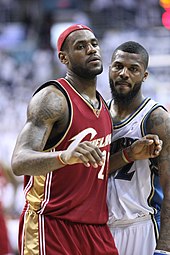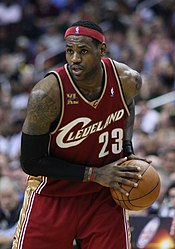Professional career
Cleveland Cavaliers (2003–10)
Rookie season (2003–04)
Rise to superstardom (2004–08)James was selected by the Cleveland Cavaliers with the first overall pick in the 2003 NBA draft.[24] In his first professional game, he recorded 25 points against theSacramento Kings, setting an NBA record for most points scored by a prep-to-proplayer in his debut outing.[25] In a late season match-up with the New Jersey Nets, he scored a season-high 41 points, becoming the youngest player in league history to score at least 40 points in a game at 19 years.[26] He was eventually named theRookie of the Year, finishing with averages of 20.9 points, 5.5 rebounds, and 5.9 assists per game.[27] He became the first Cavalier to receive the honor and joinedOscar Robertson and Michael Jordan as the only players in NBA history to average at least 20 points, 5 rebounds, and 5 assists per game in their rookie year (Tyreke Evans has since joined this group).[28] The Cavaliers finished the season 35–47, failing to make the playoffs despite an 18-game improvement over the previous year.[29]
James recorded his first career triple-double on January 19 of the 2004–05 season, becoming the youngest player in league history to do so at 20 years.[27][30] His play earned him his first All-Star Game selection, where he added 13 points, 8 rebounds, and 6 assists in a winning effort for the Eastern Conference.[31] On March 20, he scored 56 points against the Toronto Raptors, setting Cleveland's new single game points record.[32] With averages of 27.2 points, 7.4 rebounds, 7.2 assists, and 2.2 steals per game to finish the season, he became the youngest player in NBA history to be named to an All-NBA Team.[7] Despite a 30–20 record to start the year,[32] Cleveland again failed to make the playoffs, finishing the season at 42–40.[33]
At the 2006 All-Star Game, James led the East to victory with a 29-point and 6-rebound performance, becoming the youngest ever winner of the All-Star Game MVP Award at 21 years, 51 days.[34] For the season, he averaged 31.4 points, 7 rebounds, and 6.6 assists per game, becoming the youngest player in league history to average at least 30 points per game.[27][35] He was considered a strong candidate for the Most Valuable Player Award but eventually finished second in the voting to Steve Nash; however, he was awarded co-MVP honors with Nash by The Sporting News.[36] Under James' leadership, the Cavaliers qualified for the playoffs for the first time since 1998.[37] In his playoff debut, he recorded a triple-double in a winning effort versus the Washington Wizards.[38] In Game 3 of the series, he made the first game-winning shot of his career, making another in Game 5.[39] Cleveland would go on to defeat the Wizards before being ousted by theDetroit Pistons in the second round.[40][41]
After the 2006 Playoffs, James and the Cavaliers negotiated a three-year, $60 million contract extension with a player option for a fourth year.[44] Although it was for fewer years and less money than the maximum he could sign, it allotted him the option of seeking a new contract worth more money as an unrestricted free agent following the 2009–10 season.[44] He discussed this decision with Dwyane Wade and Chris Bosh, fellow members of his 2003 draft class, who also re-signed with their respective teams while allowing them to be unrestricted agents in 2010.[45]
Early in the 2006–07 season, James was criticized for a regression in his passing skills and shot selection, stemming from a lack of effort and focus.[46] His play rebounded after the All-Star break and he ended the year with averages of 27.3 points, 6.7 rebounds, 6 assists, and 1.6 steals per game.[7] The Cavaliers finished the season with 50 wins for the second consecutive year and entered the playoffs as the East's second seed.[47][48] In Game 5 of the Conference Finals, James notched 48 points with 9 rebounds and 7 assists, and scored 29 of Cleveland's last 30 points including the game-winning lay-up with two seconds left against the Pistons.[49] After the game, play-by-play announcer Marv Albert called the performance "one of the greatest moments in postseason history" and color commentatorSteve Kerr called it "Jordan-esque".[50] In 2012, ESPN ranked the performance the fourth greatest in modern NBA playoff history.[51] The Cavaliers won the series to advance to theFinals versus the San Antonio Spurs, losing in four games.[52] For the Finals, James averaged 22 points, 7 rebounds, and 6.8 assists per game.[27]
Midway through the 2007–08 season, James was named All-Star Game MVP for the second time behind a 27-point, 8-rebound, and 9-assist performance.[53][54] On March 21, he moved past Brad Daugherty as the Cavaliers' all-time leading scorer in a game against the Raptors, doing so in over 100 less games than Daugherty.[55] With seven triple-doubles to finish the year, James set a new personal and team record for triple-doubles in a season.[56] His 30 points per game were also the highest in the league, representing his first scoring title.[57] Despite his individual accomplishments, Cleveland's record fell from the year before to 45–37.[58] Seeded fourth in the East entering the playoffs, the Cavaliers defeated the Wizards in the first round for the third consecutive season before being eliminated in seven games by the Boston Celtics in the next round.[59] During the decisive seventh game in Boston, James scored 45 points and Paul Pierce scored 41 in a game the Associated Press described as a "shootout".[60]
First MVP tenure (2008–10)
At the conclusion of the 2008–09 season, James finished second in Defensive Player of the Year voting and made his first All-Defensive Team with 23 chase-down blocks and a career-high 93 total blocks.[62][63] He also became only the fourth postmerger player to lead his team in points, rebounds, assists, steals, and blocks in a single season.[64] Behind his play, Cleveland went a franchise record 66–16 and fell one game short of matching the best home record in league history.[65] With averages of 28.4 points, 7.6 rebounds, 7.2 assists, 1.7 steals, and 1.2 blocks per game, James became the first Cavalier to win the MVP Award.[66]
In the 2009 Playoffs, Cleveland swept the Pistons and the Atlanta Hawks to earn a match-up with the Orlando Magic in the Conference Finals.[67] In Game 1 of the series, James scored 49 points on 66 percent shooting in a losing effort for the Cavaliers.[51] In Game 2, he hit a game-winner to tie the series at 1–1.[68] Cleveland would lose the series in six games, and following the loss in Game 6, James immediately left the floor without shaking hands with his opponents, an act many media members viewed as unsportsmanlike.[69][70]For the series, he averaged 38.5 points, 8.3 rebounds, and 8 assists per game,[71] finishing the postseason with a career playoff-high 35.3 points per game.[72]
Midway through the 2009–10 season, the Cavaliers' guards experienced significant injuries, forcing James into a temporary point guard role.[73] With increased minutes as the team's primary ball handler, he averaged a career-high 8.6 assists with 29.7 points, 7.3 rebounds, 1.6 steals, and 1 block per game on 50 percent shooting en route to a second consecutive MVP Award.[74] Cleveland also finished the season with the league's best record for the second straight year.[75] In the playoffs, the Cavaliers beat the Bulls in the first round but fell to the Celtics in the second round.[76]James was heavily criticized for not playing well in Game 5 of the series when he shot only 20 percent on 14 shots, scoring 15 points.[77] At the conclusion of the game, he walked off the court to a smattering of boos from Cleveland's home crowd, the team having just suffered their worst home playoff loss ever.[78] The Cavaliers were officially eliminated in Game 6, with James recording 27 points, 19 rebounds, and 10 assists, but on just 38 percent shooting with 9 turnovers.[76]
2010 free agency
Main article: The Decision (TV special)
James became an unrestricted free agent at 12:01 am EDT on July 1, 2010.[80] During his free agency he was courted by several teams including the Bulls, Los Angeles Clippers,Miami Heat, New York Knicks, New Jersey Nets, and Cavaliers.[81] On July 8, he announced on a live ESPN special titled The Decision that he would sign with the Heat.[82]The telecast, broadcast from the Boys & Girls Club of Greenwich, Connecticut, raised $2.5 million for the charity and an additional $3.5 million from advertisement revenue that was donated to other charities.[83][84] The day before the special, fellow free agents Chris Bosh and Dwyane Wade had also announced they would sign with Miami.[85][86] James decided to join with Bosh and Wade in part so that he could shoulder less of the load offensively, thinking that his improved teammates would give him a better chance of winning a championship than had he stayed in Cleveland.[87][88] Heat president Pat Riley played a major role in selling James on the idea of playing with Bosh and Wade.[89] Relieved of the burden of scoring, James thought he could be the first player to average a triple-double in a season since Oscar Robertson.[87]
James drew immense criticism from sports analysts, executives, fans, and current and former players for leaving the Cavaliers. The Decision itself was also scrutinized and viewed as unnecessary. Many thought the prolonged wait for James' choice was unprofessional as not even the teams courting him were aware of his decision until moments before the show.[90] Upon learning that James would not be returning to Cleveland, Cavaliers owner Dan Gilbert published an open letter to fans in which he aggressively denounced James' actions.[91] Some angry fans of the team recorded videos of themselves burning his jersey.[92] Former NBA players including Michael Jordan and Magic Johnson were also critical of James, condemning him for joining with Bosh and Wade in Miami and not trying to win a championship as "the guy".[93][94][95] James drew further criticism in a September interview with CNN when he claimed that race might have been a factor in the fallout from The Decision.[96][97] As a result of his actions during the 2010 free agency period, James quickly gained a reputation as one of America's most disliked athletes, a radical change from years prior.[98][99] The phrase "taking my talents to South Beach" became a punch line for critics.[100][101]
Immediately following The Decision, James claimed that there was nothing he would change about the handling of his free agency despite all the criticism.[102] Since then, he has expressed regret over his actions. During the 2010–11 season, he said he "probably would do it a little bit different ... But I'm happy with my decision."[103] James relented about the special before the 2011–12 season: "... if the shoe was on the other foot and I was a fan, and I was very passionate about one player, and he decided to leave, I would be upset too about the way he handled it."[99]















No comments:
Post a Comment